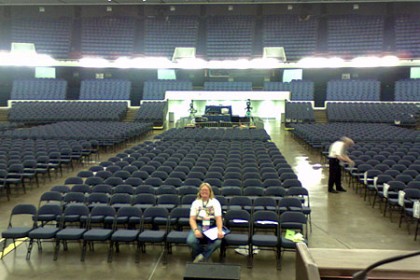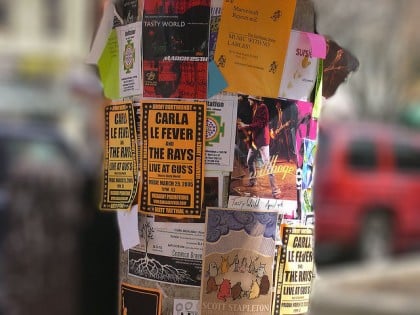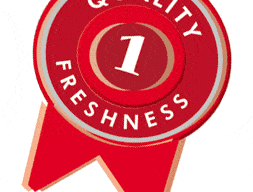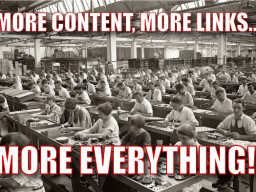“I have been blogging 15 times a week and it isn’t working.”
“I know tons of people who write excellent content but they are not well known, so that great content doesn’t do anything for them.”
“Build it and they will come is BS. Am I supposed to just pray for links?”
Why would anyone think that?
It’s true.
All the great content in the world isn’t going to help – if you don’t let people know about it.
In terms of marketing, website content is not only a vehicle for marketing products and services, but the content itself also needs to be marketed. It seems as though many search engine marketers don’t understand that any good product, whether it is a tangible item for sale, or information that you’d like people to read, needs effective promotion – not just internet stuff like backlinks.
Most of the time, the best promotion of a website does not involve hitting a submit button.
Whether you are ready for it or not, Google is moving away from the traditional “links are like votes” view of backlinks to a website and placing more emphasis on social signals like sharing. This is not breaking news, since Google has been saying it for a few years, at least. As recently as this week, Google made some changes to the Webmaster Guidelines that change the emphasis from building links to building quality websites. And it makes sense. When you consider the original reasons people would link to other websites in the old days before link-based search engine algorithms, it was because the site or page was something they liked or felt would be of value to their own readers. Sometimes it was a discovery, and the desire to say “look how awesome I am for finding this great new thing.” Real social sharing happens the same way.
But the question remains: “How do people find out about this great content?”
This is where internet marketers need to remember the “marketing” part. Getting found without artificial link building becomes less of an exercise in knowing how to submit to directories, find a guest blog farm, or just game the system and turns into online public relations.
I recently stumbled upon a question on Google+ “What is the best link building strategy?”
I responded with:
“Best strategy: don’t ‘build’ links artificially by paying for them, putting out junk content, guest posting solely for links or anything else that does not have some value other than the link.
Instead, focus on being the best at what you do, and making your website the best it can be. Then think of online marketing as public relations – find ways to let more people know about your business and site.
That’s a very broad overview, but the truth is there is no single formulaic strategy that will work for everyone, like,do 1 press release, 18 blog posts, 1 infographic, 4 guest posts, 1 video, 247 tweets, comment on 50 other blogs per month…
…Google’s view is that links act as endorsements and signals of relevancy when they occur naturally.
You can’t strategize something that should happen naturally, but you can strategize how to make it more likely to happen.”
This caused some people who are committed to “easy” link building (aka webspam) to think that I meant “don’t get any links”, and reply with comments like the quotes at the beginning of this article about “content doesn’t matter if nobody sees it, so we have to get lots of links”. They were partly accurate. Content with no exposure really doesn’t help, but that doesn’t mean you have to break Google’s rules about artificial link building in order to succeed.
An Offline Example of Content Marketing in Action
Let’s ignore the internet for a moment and look at something offline that is all about great content and how it is promoted: the music industry.
 There are thousands of aspiring songwriters and performers. Some have amazing talent, many do not. A musical artist or group works on songs and musical skills until they have about a dozen songs worth performing for others. This is the content. In the rock & roll world, a band will then try to start booking some shows. Most of the established clubs and other venues are not likely to have some unknown “nobody” perform on a Saturday night for the club’s biggest crowd. They save the best time slots for the bands they know are already popular.
There are thousands of aspiring songwriters and performers. Some have amazing talent, many do not. A musical artist or group works on songs and musical skills until they have about a dozen songs worth performing for others. This is the content. In the rock & roll world, a band will then try to start booking some shows. Most of the established clubs and other venues are not likely to have some unknown “nobody” perform on a Saturday night for the club’s biggest crowd. They save the best time slots for the bands they know are already popular.
Google is like the big rock club where musicians want to play on Saturday night.
Almost anyone is welcome to play at the open stage night on Mondays, but nobody really goes to those except for the bands’ friends and other musicians. Page one of search results = Saturday night. Everything else = weeknights.
Let’s call the band… QFC – “Quality F-ing Content”
So how does this startup band, QFC, get a Saturday night gig at the Big G Night Club? They will play at friends’ basement parties and book some shows at smaller clubs where they can get some exposure. But that still doesn’t get them where they want to be. Only the same 30 friends come to those Tuesday evening bar gigs and no new people hear the music. QFC starts to do a little networking with other like-minded bands by playing some shows together (guest blogging?). Since QFC (the website owner) has been working very hard on their songs and performance (optimizing the website and the content), the other band’s 30 friends have seen how great QFC is and some of them start going to QFC’s shows. The following is starting to grow as these new fans also tell their friends (social sharing). A “buzz” about the band begins to happen. This doesn’t work if the band (website) sucks.

Pole Spam: Cheap, easy, annoying, and not very effective.
After weeks or months of this, QFC now has enough of a following that larger clubs want to hire them, including the Big G – but only on the Thursday night showcase (page 2 of the search results). So how does QFC get a Saturday night spot at the Big G? By promoting Quality F-ing Content more effectively.
QFC hires a publicist to put together press release for the next big show. They get on the phone with the programmers at local radio stations to try to get a little help either by playing some QFC music or at least getting a mention on-air. The band goes go to local events and give away CDs, or maybe USB flash drives containing a few songs. The music is heard and the buzz gets bigger – big enough that the Big G is willing to put QFC in the opening spot on Saturday night (somewhere on page 1 of SERPs) when everyone in town who wants to hear live rock & roll (great content) will be there. Now, even more people can see and hear Quality F-ing Content and even bigger things can happen when QFC starts making more new music.
They could also put hundreds of cheap posters on telephone poles, but that is annoying, rarely fills a club, and does not make QFC look credible (link spam).
All of this creating of good music, networking and promoting is hard work. But how long would it take Quality F-ing Content to get that gig at the Big G if they just kept cranking out awesome songs for their friends in the basement?
What can we learn from a bar band’s rise from the masses of unheard music?
- Being in a band is not easy. Neither is running a website.
- Quality F-ing Content Needs Quality Promotion.
Great content alone without effective promotion will not lift your band or website out of the basement.
Even successful musicians continue to follow a cycle of Create > Promote > Repeat by recording & releasing new material, then promoting it and going on tour to support it. Once an act becomes wildly popular (like an authority website), it becomes much easier to just release new content and everyone knows about it.
Promotion of your website is much the same way. Refine each piece of content before releasing it. Publicize it by letting your existing following know about it, as well as influential people in your industry who can help spread the word – through social media or maybe a link to your site. Get creative about it – don’t just wait to be found. If your content really rocks, it will give people a reason to share it or link to it. If it is just average, you will need to give them other good reasons to link and share.
Rock on.
Say “look how awesome I am for finding this”



